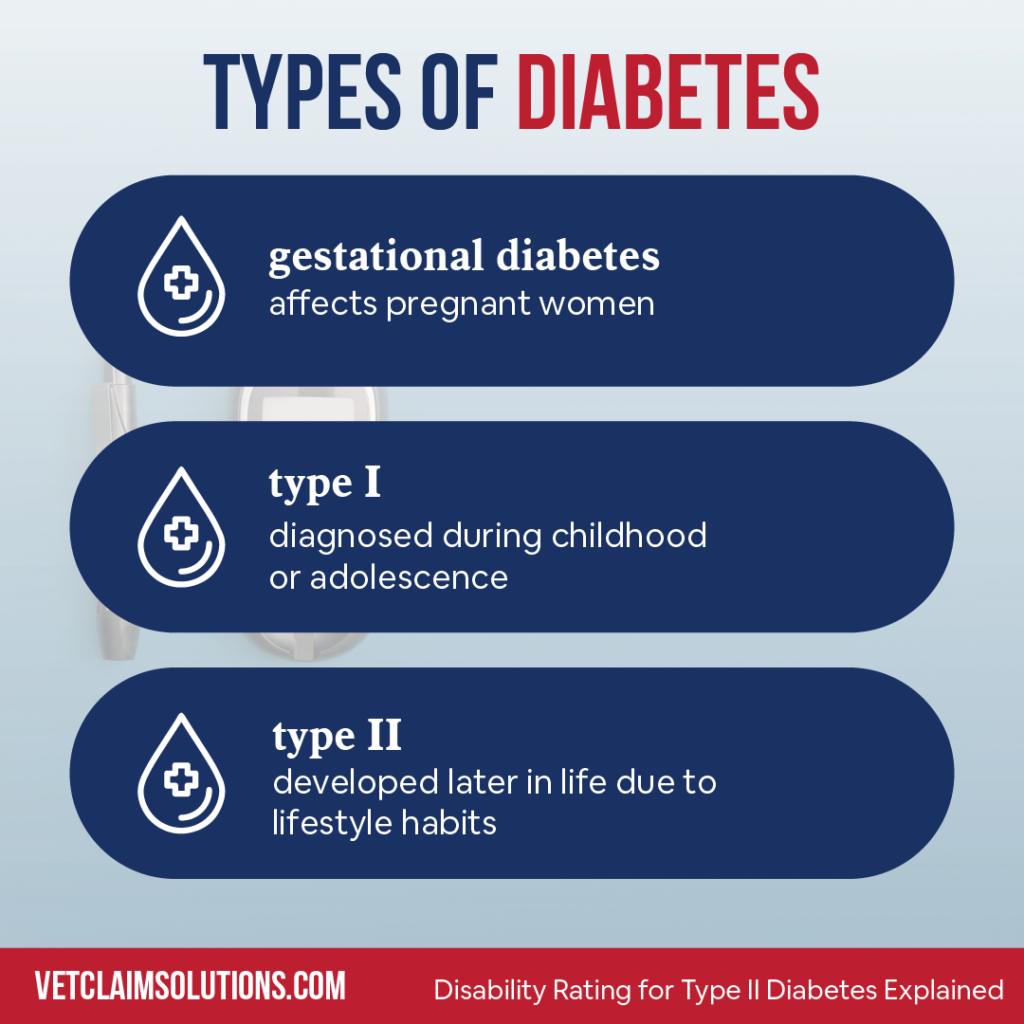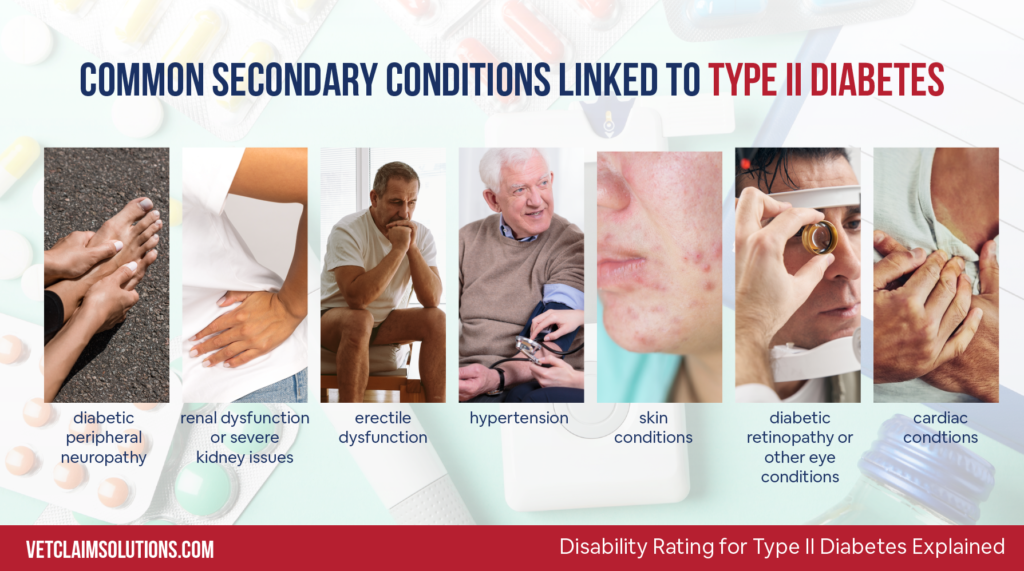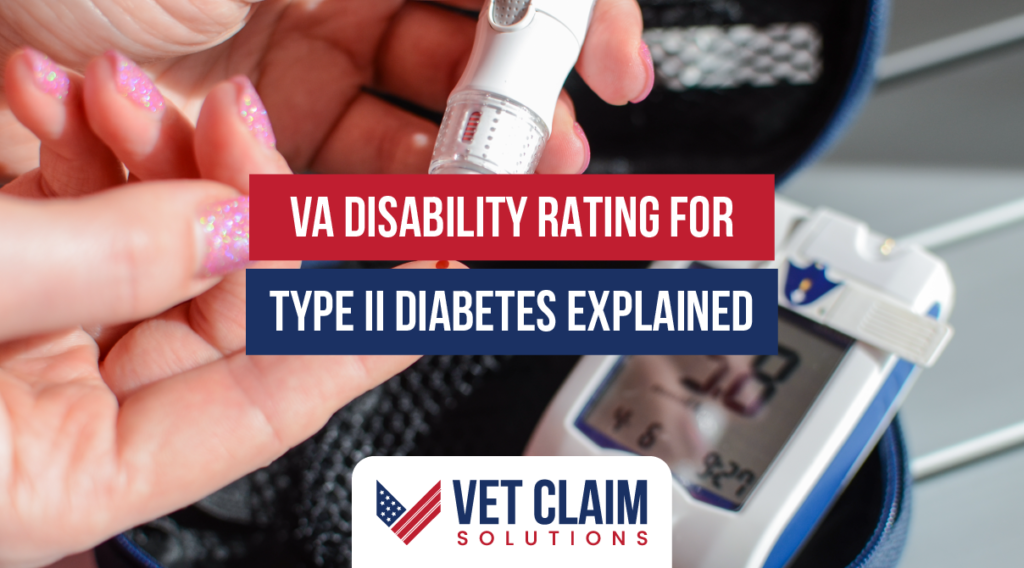Type II Diabetes is a chronic health condition that, if left unmanaged or untreated, can lead to serious medical complications such as heart disease, stroke, kidney failure, and nerve damage. If you have been diagnosed with Type II Diabetes and are a United States military veteran, you may be eligible to receive VA disability benefits.

To determine how much of a benefit you may be entitled to, the Department of Veterans Affairs (VA) uses a system of disability ratings to evaluate each claim. In this blog post, we’ll explain the VA’s disability rating for Type II Diabetes and how it impacts the benefits you receive. Read on to learn more about VA disability ratings for Type II Diabetes.
What is Diabetes Mellitus?
Diabetes mellitus is a serious medical condition affecting millions of people worldwide. It occurs when the body cannot produce enough or any insulin, which helps regulate blood sugar levels. High blood sugar can cause many problems, such as vision loss, heart disease, nerve damage and kidney failure if left untreated.
There are three types of Diabetes: Gestational Diabetes which affects pregnant women; type 1 diabetes, which is usually diagnosed in childhood or adolescence and type 2 diabetes, which is typically developed later in life due to lifestyle habits such as poor diet and lack of physical activity. Stress, age, alcohol consumption and smoking can also play a role.

The condition is especially prevalent among veterans and those over 65, with up to a quarter of veterans having Diabetes. This is largely due to obesity and other lifestyle factors, which can increase the risk of developing type 2 diabetes.
Signs and Symptoms of Diabetes
Type 1 and type 2 diabetes can have many symptoms, making knowing the signs important. Common signs may include increased thirst, extreme hunger, fatigue, unexplained weight loss, irritability, blurred vision, slow-healing sores, frequent infections and frequent urination. If you experience any of these symptoms, speaking to your doctor as soon as possible is important. Other signs may include blurry vision, tingling or numbness in the hands and feet, dry mouth and itchy skin. In some cases, extreme fatigue can be an indication of Diabetes.
Why Veterans are More Prone to Having Diabetes
Veterans are at an increased risk of developing Diabetes because they often experience multiple risk factors associated with the disease, such as:

physical inactivity
Physical inactivity is a major risk factor for developing type 2 diabetes. Veterans may experience long periods of inactive time due to deployments or illnesses related to their service. This can lead to weight gain and difficulty managing blood sugar levels.

poor eating habits
Poor eating habits also contribute greatly to the risk of developing Diabetes. Veterans may have difficulty managing their diets due to stress or limited access to healthy food options. Eating a diet high in fats and cholesterol, eating too many calories each day, or incorporating too much sugar or salt into a diet can all lead to an increased risk of Diabetes.

smoking
Smoking is another major risk factor for Diabetes among veterans.

sleep disorders
Sleep disorders, such as insomnia and obstructive sleep apnea, can also increase the risk of developing diabetes. Veterans who have trouble sleeping may not be getting enough rest, which can cause fatigue and put them at a higher risk for developing diabetes.
By understanding the major risk factors associated with type 2 diabetes, veterans can work to reduce their risk and seek early treatment if necessary.
How to Get Service Connected for Diabetes
Direct Service-Connected Condition
Direct Service-Connected Condition is the most common way veterans receive VA Disability Benefits for Diabetes. To qualify for Direct Service Connection, veterans must show that they have a current, diagnosed diabetes condition and an in-service event or illness, such as the onset of symptoms of Diabetes while serving. Veterans must provide evidence to support their claims, such as medical records, service personnel records, and lay statements. The VA will also consider evidence from private physicians or specialists who can provide additional information on a veteran’s medical condition. Furthermore, veterans must provide a current diagnosis from a VA doctor to receive any disability benefits for Diabetes.
Presumptive Due to Agent Orange
Presumed service connection means that the veteran’s medical condition is presumed to be related to their military service. Veterans who served in Vietnam or other areas where Agent Orange was used may be eligible to receive benefits for Diabetes under the Presumptive Due to Agent Orange Exposure program.
This program assumes that certain conditions, including Diabetes, were caused by exposure to Agent Orange and other chemicals used during the war. To qualify for presumptive benefits, veterans must demonstrate that they served in an area where Agent Orange was used and have a current diagnosis of Diabetes. Evidence of service in an area where Agent Orange was used may include discharge papers and service records.
Secondary Service Connected Condition
Veterans who have a currently diagnosed diabetes condition and an already approved service-connected disability may be eligible to receive benefits as a Secondary Service Connected Condition. For example, a veteran with an approved service-connected disability for another condition, such as PTSD or hearing loss, may be eligible to receive benefits for Diabetes if it is determined that the other condition caused or contributed to the development of Diabetes. To qualify, veterans must provide evidence of the approved service-connected disability and a current diagnosis from a VA doctor.
The VA Disability Ratings for Diabetes
Under 38 CFR § 4.119, the VA rates diabetes mellitus on a rating schedule of ten to one hundred. Diagnostic Code 7913 covers these ratings:

Severe cases require more than one daily insulin injection and a restricted diet. In addition, the patient must avoid strenuous occupational or recreational activities due to episodes of ketoacidosis or hypoglycemic reactions that require at least three hospitalizations per year or weekly visits to a diabetic care provider, plus either progressive loss of weight and strength or complications that would be compensable if separately evaluated.

Moderate cases requiring one or more daily injections of insulin, along with a restricted diet and regulation of activities to prevent episodes of ketoacidosis or hypoglycemic reactions requiring one or two hospitalizations per year or twice monthly visits to a diabetic care provider, plus complications that would not be compensable if separately evaluated.

Mild cases require one or more daily injections of insulin, a restricted diet and regulation of activities.

Patients who require one or more daily insulin injections and a restricted diet or an oral hypoglycemic agent with a restricted diet.

Cases that are manageable through a restricted diet only.
Common Secondary Conditions Linked to Type II Diabetes
VA recognizes that certain complications associated with type 2 diabetes can be so disabling that they may also receive a VA disability rating and be compensable as secondary service-connected conditions if you are already primarily connected for Diabetes due to your service. Remember that VA cannot have considered these complications as part of the rating decision that granted service connection for Diabetes. Here are some of the common secondary conditions associated with Type II Diabetes we see in veterans:

Diabetic Peripheral Neuropathy
Diabetic peripheral neuropathy is characterized by nerve damage in the arms and legs due to high blood sugar levels. Symptoms include tingling or burning sensations or even a complete lack of sensation.
Renal Dysfunction / Severe Kidney Issues
Diabetes can cause damage to the kidneys that can result in severe kidney issues. This condition is known as diabetic nephropathy and can be disabling for veterans with type 2 diabetes.
ED (Erectile Dysfunction)
Diabetes can cause damage to the blood vessels, which can lead to erectile dysfunction in males. This can have a significant impact on veterans’ quality of life.
Hypertension and/or High Blood Pressure
High blood sugar levels over time can cause damage to the arteries, leading to hypertension or high blood pressure. This condition can be difficult to manage, and having it service-connected can significantly improve a veteran’s quality of life.
Skin Conditions
Diabetes type 2 is associated with an increased risk for skin conditions such as psoriasis, seborrheic dermatitis, and more. These conditions can cause a great deal of discomfort and embarrassment in veterans.
Diabetic Retinopathy and Other Eye Conditions
Diabetes type 2 can increase the risk of developing eye conditions, such as diabetic retinopathy, conjunctivitis, and cataracts. These conditions can cause vision loss if left untreated.
Cardiac Conditions
Diabetes type 2 can increase the risk of developing cardiac conditions, such as coronary artery disease, heart attack, and stroke. These serious conditions can lead to significant disability if not managed properly.
These are some of the most common secondary conditions associated with type 2 diabetes in veterans. Still, there may be other medical complications that can also qualify for a VA disability rating. Suppose you’re currently service-connected for Diabetes due to your service. In that case, it’s important to speak to a VA-accredited attorney to better understand the potential secondary conditions associated with Diabetes that may be compensable.
Assistance with Your Claim for Type II Diabetes
At Vet Claim Solution, our experienced claims coaches understand the complexities of VA claims and can help you get the benefits you deserve. We’ll review your claim, determine if any additional conditions are potentially compensable, and guide you through filing or appealing a VA disability claim for type 2 diabetes. Contact us today to learn more about how we can help you get the VA disability benefits you deserve. Don’t wait. Start your claim today and improve your quality of life!

FAQ’S
1. Is it hard to get a disability for type 2 diabetes?
Obtaining disability compensation for type 2 diabetes can be challenging, as it requires the veteran to provide evidence to the VA that their condition results from their military service. However, with the right documentation and an experienced VA-accredited attorney, veterans can successfully obtain compensation for Type II diabetes.
2. Is Type 2 diabetes a service-connected disability?
Yes, Type 2 diabetes can be service-connected if it is determined that the veteran’s condition was caused or aggravated by their military service. The veteran must provide evidence to prove their case, such as medical and service records, but it can be done.
3. What are the VA secondary conditions to Type 2 diabetes?
The VA recognizes several secondary conditions that can be service-connected due to the effects of type 2 diabetes, including ED, hypertension and/or high blood pressure, skin conditions, diabetic retinopathy and other eye conditions, cardiac conditions and more. It is important to speak to a VA-accredited attorney to better understand all the potential secondary conditions associated with type 2 diabetes that may be service-connected.
4. What is the VA rating code for Diabetes?
The VA rating code for Diabetes type 2 is 5002. This code determines the level of compensation a veteran with type 2 diabetes is eligible for. The amount of compensation can vary depending on the severity and impact of the condition on the veteran’s overall health.
5. What is VA disability compensation for Type II Diabetes?
VA disability compensation is a monthly payment given to service-connected veterans for a disability. Type II Diabetes can be service-connected if it is determined that the condition was caused or aggravated by military service. The veteran may be eligible for VA disability compensation. Additionally, if a veteran has any secondary conditions related to their Diabetes, they may qualify for additional disability compensation.



This Post Has One Comment
Pingback: VA Disability Rating for Hypothyroidism – VET CLAIM SOLUTIONS